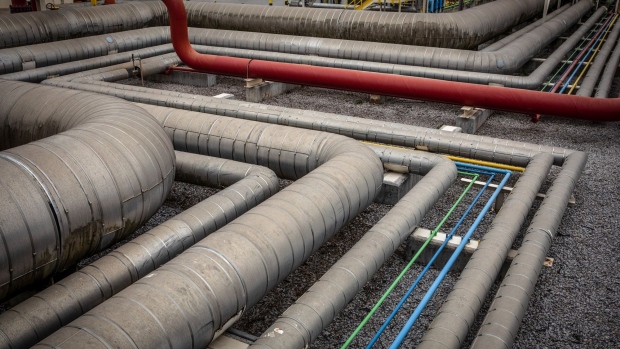Jul 11, 2022
Europe Gas Fall as Return of Key Pipeline Part May Ease Tensions
, Bloomberg News

(Bloomberg) -- European natural gas fell after Canada said it would return a stranded turbine for a key Russian pipeline to Germany, raising optimism that tensions with Moscow will ease.
Benchmark futures dropped as much as 12%. The Canadian move brings relief to Germany, and more widely to Europe, as deeply reduced flows through the Nord Stream pipeline have been threatening the region’s plan to fill storage sites in time for winter and bringing the risk of rationing.
The Kremlin said last week that the equipment would help raise shipments to Europe. Gazprom PJSC operated the pipeline at just 40% of its capacity since last month after the turbine was sent to Canada for maintenance and wasn’t returned because of sanctions on Russia. Berlin urged for it to be sent back to ease the supply crisis.
The test will come next week when annual maintenance work on the pipeline that stated on Monday is set to be completed. Germany had voiced concerns over whether supplies would resume. Gazprom needs six major turbines to operate the link at full capacity, but not all of the components that are still in Russia are in working condition because they need maintenance, the company has said.
Also read: Putin Is Set to Halt Gas and Germany Fears It’s Not Coming Back
The Canadian government issued a “time-limited and revocable” permit to exempt the piece of equipment from sanctions on Russia’s oil and gas industry over its invasion of Ukraine, citing the need to help its ally Germany avoid an energy crisis.
Crisis Situation
The supply squeeze is fueling Europe’s worst energy crunch in decades, inflating bills and forcing the industry to seek ways to conserve energy and utilities to stay afloat. Analysts have warned that a prolonged cut in flows from Russia, and even more so potential full halt in supplies, would derail stockpiling campaign for the winter, when demand peaks.
Should Russian gas supply return to current levels following maintenance on the Nord Stream pipeline, the imports from the supplier would help ensure a 87% fill level of storage sites, meaning a comfortable winter, BloombergNEF said.
Dutch front-month gas, the European benchmark, was 6.9% lower at 163 euros per megawatt-hour at 8:35 a.m. in Amsterdam. It rose 19% last week.
Concerns over Russian supplies and ability of the region to prepare for the winter remain. French Finance Minister Bruno Le Maire said Europe must prepare for gas deliveries to be shut off entirely in retaliation for sanctions on Russia.
©2022 Bloomberg L.P.






